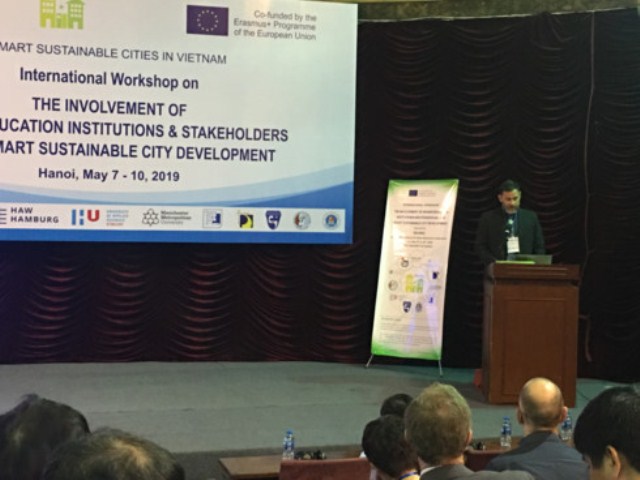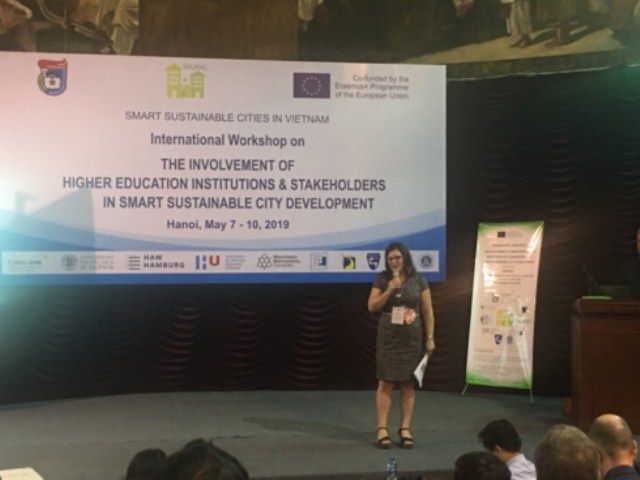The event was co-hosted by the Sustainability Alliance of Urban Networks in Asian Cities (SAUNAC) consortium and the VNU University of Science. Attending the event were representatives from various embassies, relevant ministries, and key stakeholders.
Addressing the event, Vu Hoang Linh, Vice Rector of VNU University of Science, emphasised that Vietnam has recorded robust development over the past 20 years, resulting in people demanding a higher living standard in a more sustainable manner.
Mr Linh noted the appropriateness of the workshop’s theme in relation to the VNU University of Science’s training development strategy which is aimed at conducting research in basic and applied science.
He stressed that over the previous two years, five European and six Vietnamese partner universities have been working together in the SAUNAC project. This partnership has yielded significant results by improving the quality of training activities and enhancing linkages between universities and businesses as part of the drive to boost the development of sustainable smart cities in Vietnam.
Upon addressing the workshop, Tom Corrie, Deputy Head of Cooperation Section - European Union Delegation to Vietnam, underlined that higher education is a priority for both Europe and the Vietnamese government. He added that higher education is a responsibility of all 28 member states and the role of the EU is to promote Europe as a centre of excellence for higher education.

Tom Corrie, Deputy Head of Cooperation Section - European Union Delegation to Vietnam
Mr Corrie underscored the significance of Erasmus+ Capacity Building in Higher Education (CBHE) projects. All of which are aimed at modernising and reforming higher education institutions, developing new curricula, improving governance, and developing relationships between higher education institutions and enterprises.
Around 27 per cent of the annual global budget for CBHE projects has been earmarked for Asian countries. Vietnam has so far participated in 51 projects, all of which have been jointly implemented by both European and Vietnamese universities.
Mr Corrie noted that the projects have covered a range of fields including sustainable agriculture, food safety, energy, cloud computing, and sustainable cities.

Project Manager of SAUNAC project Henna Knuutila
Project Manager Henna Knuutila brought participants up to speed about the achievements of Erasmus+ SAUNAC, adding that SAUNAC is a EU-Erasmus+ funded capacity building project, aimed at giving universities in Vietnam and their stakeholders the tools to enable a transition in Vietnam through a range of activities.
The project is made up of five University partners from European nations including Finland, Germany, Netherlands, Spain, and the UK, as well as six Vietnamese Universities from Hanoi, Hai Phong, Hue, Da Nang, and Ho Chi Minh City.
Ms. Knuutila pointed out that the fresh co-operation between universities, enterprises and public bodies have provided valuable learning opportunities for students who can design solutions for environmental challenges in major cities as part of their studies.
In the long term, participants will form sustainable alliances together. This trend will not only take place between universities in Vietnam, but between universities and enterprises at a regional, national, and international level, Ms. Knuutila noted.
During a panel discussion and in subsequent sessions, representatives from both relevant ministries and key stakeholders elaborated on how higher education institutions and stakeholders are working together to develop sustainable smart cities in Vietnam. In addition, they worked to devise future solutions and activities in this field, especially to step up co-operation between businesses and academia.
The highlight of the activities was the signing of a Letter of Intent between the Smart City Netherlands consortium and the Urban Development Agency of the Ministry of Construction by Dutch partners and the Center of Expertise for Smart Sustainable Cities in the University of Applied Science in Utrecht.
Information about the project: www.saunac.eu
Contact:
- Project Manager: Knuutila Henna
Turku University of Applied Sciences
Email: henna.knuutila@turkuamk.fi
- Vietnam National Coordinator: Vu Van Manh - VNU University of Science
Email: vuvanmanh@hus.edu.vn
Source: vov.vn